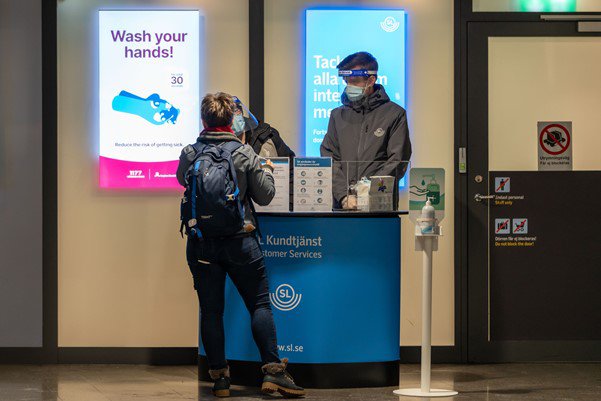Sweden failed again you are wrong. I should start keeping count.
https://www.opendemocracy.net/en/can-europe-make-
Sweden’s failed COVID strategy leaves the country deeply divided
The Swedish model became a symbol for anti-lockdown and no-mask movements across the world. But it is no longer a source of consensus at home
Irene Peroni
11 March 2021, 7.17pm
Sweden continues to battle the new, more contagious COVID-19 strain, February 2021
|
Wei Xuechao/PA. All rights reserved.
Share this
URL copied to clipboard
Sweden, a bastion of welfare and one of the countries that scores highest on pretty much anything to do with the wellbeing of its inhabitants, seems to have woken up to a serious identity crisis.
The choice to adopt and follow a COVID-19 strategy unlike any other in Europe has recently led to an extreme polarization in an otherwise rather homogenous public debate.
Statistics prove beyond a shadow of doubt that the other Scandinavian countries, which enforced much stricter policies, have suffered considerably fewer losses.
Sweden’s state epidemiologist Anders Tegnell, who firmly opposed face masks and believed that measures should rely only on the Swedish people’s sense of personal responsibility, enjoyed overwhelming support in the early phases of the crisis.
Fan pages, mostly on Facebook, counted tens of thousands of members. His face featured on T-shirts, gadgets and even a tattoo, worn on the arm by one of his proudest admirers.
The alluring message that Sweden’s approach was right and everybody else’s self-isolation regime was hopelessly wrong reached well beyond the nation’s borders.
In other European countries, staunch critics of lockdowns pointed at footage of happy, bare-faced Swedes hanging out in crowded bars as evidence that the draconian measures imposed elsewhere were an unnecessary violation of civil rights.
The Swedish model became a symbol for anti-lockdown and no-mask movements across the world.
Beyond the ‘opinion corridor’
But now, one year after the first cases of COVID-19 were detected in Scandinavia, the situation has changed dramatically.
Sweden’s Public Health Agency recently announced that several among its key figures have been granted police protection.
Tegnell himself is currently enduring massive criticism and even death threats.
In one instance, a citizen went so far as to argue that he should be “executed by a firing squad on live state television”.
And yet, despite the fact that both King Carl XVI Gustaf and prime minister Stefan Löfven in December publicly acknowledged that the Swedish approach had failed, Tegnell has never retracted anything, let alone made an official apology.
Until very recently, an astounding, near total lack of criticism, not only from public opinion but even from major opposition parties, characterised Sweden’s COVID. This might be due to the so-called
åsiktskorridor (‘opinion corridor’).
This is a Swedish concept meaning that the public debate tends to take place within certain limits, along an established path. Those who disagree, often choose not to speak out. They feel out of tune with the rest of society.
Hate speech
Andreia Rodrigues, a 26-year-old law graduate from Portugal, started organizing protests in central Stockholm in the early days of the pandemic, when she realized that the lack of preventive measures could lead to a large number of casualties. She was met with suspicion and hostility.
“Especially during the first few weeks, many would tell us to go home if we didn’t like Sweden’s strategy,” she recalls.
“Others would shout ‘long live Sweden’, as if we were enemies of the country just because we expressed an opinion which differed from the mainstream one.”
There were some people who would send messages to express solidarity to her group, called “Save Sweden – COVID-19”, but would not want to join for fear of the stigma.
“They would write things like ‘what would my family and my colleagues say if they understood that I am critical of the strategy?’”
Keith Begg, a 46-year-old Irish/Swedish national, was another key figure who lobbied for a stricter pandemic strategy.
The moderator of a private Facebook page called “Media watchdogs of Sweden”, which is critical of Sweden’s COVID-19 strategy, Begg recently decided to move back to Ireland after his group was accused on public radio of deliberately trying to damage Swedish interests abroad.
“I received a letter in my postbox referring to me as a traitor, I got hate speech… calling me a dirty foreigner,” Begg told The Irish Times.
Haters deemed one group of people even more despicable than foreigners who had a critical view of Sweden: they were the so-called
landsförrädare, ‘traitors’.
Early in spring last year, a group of 22 researchers, later referred to as ‘the 22’, published an open letter criticizing Sweden’s Public Health Agency in the daily newspaper Dagens Nyheter. They did so at a time when the vast majority of the population supported “the strategy”.
Lena Einhorn, a virologist and a member of the 22, knows how it feels to receive abusive mail and even threats.
Now that public opinion has shifted, it is someone else’s turn to be affected by “the shit we received this spring”, she told Swedish news agency TT.
She underlined that at the time, “prime minister Stefan Löfven did not express any anger for what we were being exposed to.”
Scarred and divided
But with the Swedish public more divided than ever, politicians appear to increasingly deny the obvious.
Tegnell himself went as far as to claim that “the Swedish strategy is actually similar to those adopted by all countries”, raising a few eyebrows among his Scandinavian neighbours.
Norway, for one, had repeatedly warned Sweden against its strategy early in the crisis – not least because it was pretty clear that pursuing such different paths would have damaged the close cooperation and exchange of workforces between the two countries.
While the then-US president, Donald Trump, and UK prime minister, Boris Johnson, gave up on their idea of herd immunity as a viable solution very early on, Sweden de facto stuck to it for much longer – and imposed the first measures far too late.
The first time the authorities advised people to use face masks on public transport at peak time was in December.
Some blame Sweden’s failures and shortcomings on the enormous power entrusted to the Public Health Agency, which is part of Sweden’s “administration model”.
Agencies are in charge of making day-to-day decisions in the areas they are responsible for.
It is very likely that once the threat is over, this model will have to be dismantled and rebuilt.
The handing of the pandemic will inevitably leave Swedish society deeply scarred and divided, while its repercussions might be felt way beyond the next general elections in September 2022.







